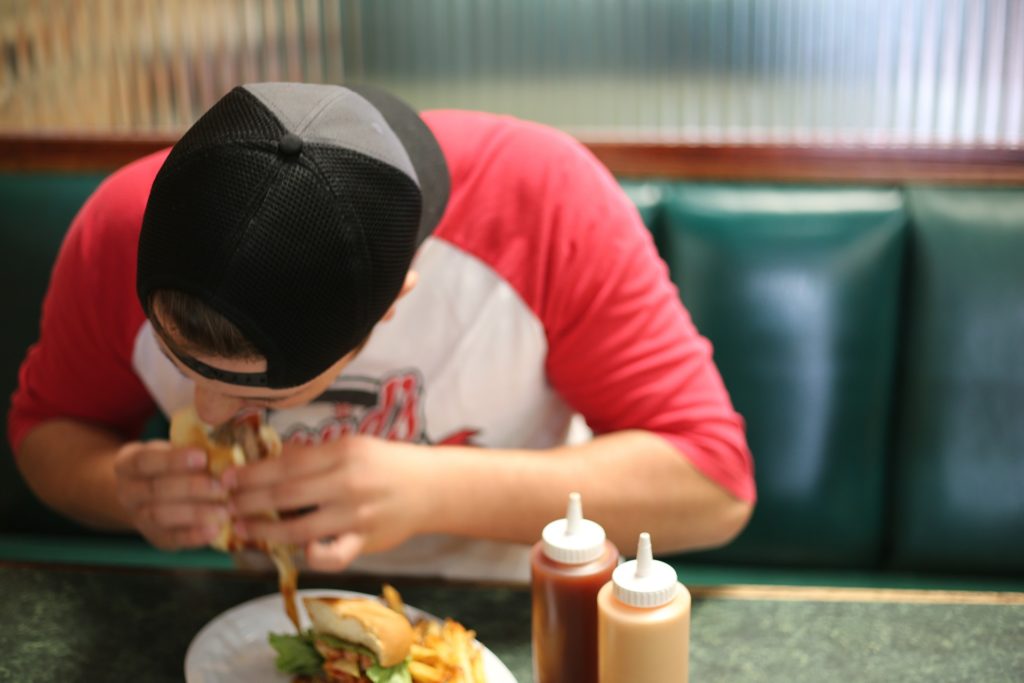
Many individuals may struggle with an abnormal relationship with food in some way, shape or form.
Whether food is eaten compulsively, for emotional reasons, obsessed about, restricted, avoided or binged on, countless people may feel out of control when it comes to food, or even confused about what it means to have a normal relationship with food.
Having a clearer understanding about some of the potential disorders that exist around food can bring greater awareness about these disorders in general, helping people better identify with things they are possibly struggling with.
Because of the stigma and shame that often revolves around food and eating issues, there is often a misunderstanding about food addiction and eating disorders.
Many people develop an idea or understanding about these complex issues through something that is read in a magazine, via social media, or on the television, but the reality is that there is a variety of factors involved with these disorders.
Food Addiction & Eating Disorders
While a food addiction and eating disorders are different diseases that should be approached and treated otherwise, there are some similarities between the two as well. Eating disorders are recognized as psychiatric and brain-based illnesses.
Many individuals who are struggling with an eating disorder have a biological predisposition that makes them more susceptible to developing this form of mental illness.

Environment also plays a factor in the development process of an eating disorder.
It is often said “Genetics loads the gun and environment pull the trigger” in discussion of eating disorder development, meaning that a person biologically susceptible to an eating disorder may be triggered by environmental stressors, such as the experience of trauma, periods of transition and change, stress, anxiety, and more.
EDs Can be Fatal
Eating disorders are fatal diseases, and more people die from complications related to eating disorders than any other mental illnesses.
The behaviors related to eating disorders typically cannot be stopped without professional help and treatment and tend to become worse without any type of intervention.
It is often misunderstood that eating disorders are a “disease of vanity”, meaning that people with eating disorders are simply obsessed about their weight or looking a certain way.

However, there is nothing father from the truth, as eating disorders are extremely complex illnesses that often have little to do with one’s appearance or the food itself. A food addiction similarly involves biological factors, as the manner in which the brain responds to eating certain foods can trigger the urge and desire to eat and continue eating.
A food addiction is often mistaken for a lack of willpower or self-control when it comes to eating, but the strong biological responses to eating food, especially those that are more highly palatable, can make the experience of eating itself addicting.
In the same way that a drug addict’s reward center of the brain is triggered when ingesting certain substances, a food addict also experiences the rush or euphoria of neurotransmitters that are released in the brain from eating certain foods.
This can make the urge and desire to eat and continue eating intolerable, and many food addicts will find themselves frequently experiencing cravings for certain foods.
There are many adverse side effects associated with a food addiction as well, and just as a person addicted to drugs or alcohol would need professional treatment for recovery, so does a food addict need help for managing their habits and behaviors.
If you or someone you care for is struggling with any type of abnormal relationship with food, be sure to seek out professional help and support. Being evaluated by a professional will allow for a clearer understanding of what you may be facing, which can help better support treatment options for recovery.
Because the treatment approaches for a food addiction and eating disorder are different, it is important to be diagnosed by a specialist and to not attempt to self-diagnose. Recovering from a food addiction and/or an eating disorder are both possible with professional help and assistance.

About the Author: Crystal is a Masters-level Registered Dietitian Nutritionist (RDN) with a specialty focus in eating disorders, maternal/child health and wellness, and intuitive eating. Combining clinical experience with a love of social media and writing, Crystal serves as the Special Projects Coordinator for Eating Disorder Hope/Addiction Hope, where her passion to help others find recovery and healing is integrated into each part of her work.
As a Certified Intuitive Eating Counselor, Crystal has dedicated her career to helping others establish a healthy relationship with food and body through her work with EDH/AH and nutrition private practice.
The opinions and views of our guest contributors are shared to provide a broad perspective of addictions. These are not necessarily the views of Addiction Hope, but an effort to offer discussion of various issues by different concerned individuals.
We at Addiction Hope understand that addictions result from a combination of environmental and genetic factors. If you or a loved one are suffering from an addiction, please know that there is hope for you, and seek immediate professional help.
Reviewed By: Jacquelyn Ekern, MS, LPC on January 25, 2016
Published on AddictionHope.com

